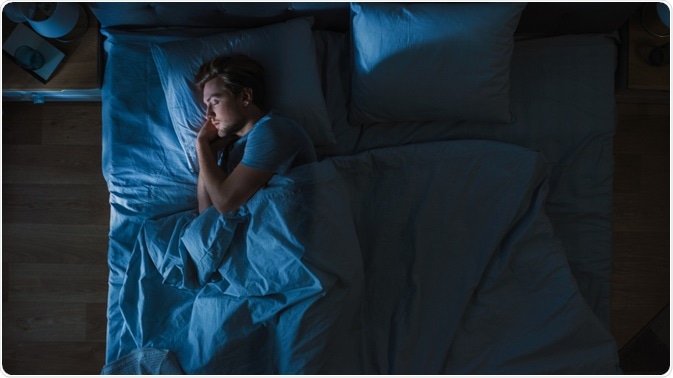Stimulants are substances that have an effect on the central nervous system and body, leading to increased alertness and difficulty in getting to sleep. This is in contrast to sedatives and hypnotics, which decrease the activity of the brain and increase sleepiness.

Sleep. Image Credit: Gorodenkoff/Shutterstock.com
For this reason, stimulants are commonly associated with wakefulness and can help to improve mood and stress response during the day. Stimulants can also be used to improve sleep in some patients, particularly when given in doses during the day to improve function.
What is a Stimulant?
A stimulant is any substance that exerts an effect on the body to increase physiological or nervous activity. They often act on the central nervous system to increase mental alertness and brain function, reducing the feeling of sleepiness.
Caffeine is a commonly available stimulant that many people use to self-manage excessive sleepiness during the day. It helps to increase mental alertness and can improve thinking pathways, which can offer an effective stimulatory effect for mild cases of sleepiness.
However, for more severe cases such as narcolepsy or sleep apnea, stimulant medications may offer a more profound benefit. Examples of stimulants include:
- Armodafinil (Nuvigil)
- Methylphenidate (Ritalin)
- Amphetamines (Adderall)
- Modafinil (Nuvigil)
Stimulants to Improve Excessive Sleepiness
It is important first to consider the underlying cause of excessive sleepiness when commencing management for the condition. This typically includes alterations to sleep schedule, routines, stress, and sleeping environment.
Some medications can be useful in the treatment of excessive sleepiness, including some stimulants. These can be prescribed to help individuals to stay awake and participate in daily activities as usual.
Additionally, shift workers that have an interrupted sleep schedule often feel sleepy at work and may benefit from stimulant medications when other methods, such as changing sleep habits, are not successful.
Stimulants to Improve Sleep in Adults with ADHD
Attention-deficit/hyperactivity disorder (ADHD) is linked to symptoms such as increased sleep latency and daytime somnolence and reduced REM sleep. Adult patients may benefit from the use of central nervous stimulants such as methylphenidate to aid sleep. Sleep is a significant issue for many adults with ADHD, and poor sleep habits can worsen daytime symptoms and create a vicious cycle.
One study suggested that administration of the stimulant help to improve sleep, including the polysomnographic recordings, sleep latency, and nocturnal awakenings. However, the overall sleep quality and reported satisfaction of rest were similar between the methylphenidate group and the control group.
Adverse Effects and Safety
Several considerations should be accounted for during the decision-making process when using stimulants to increase daytime wakefulness or aid sleep at night.
Adverse effects of stimulants may include:
- Hypertension
- Irritability
- Tremor
- Insomnia
- Headache
- Nausea and diarrhea
- Anxiety
- Dizziness
- Stuffy nose
- Back pain
The side effects experienced depend on the specific drug used, dosages, and the individual characteristics of the patient.
It is important to understand that stimulant medications should be used in combination with other management techniques, such as habitual changes or anxiety management.
References
Further Reading
Last Updated: Apr 8, 2023